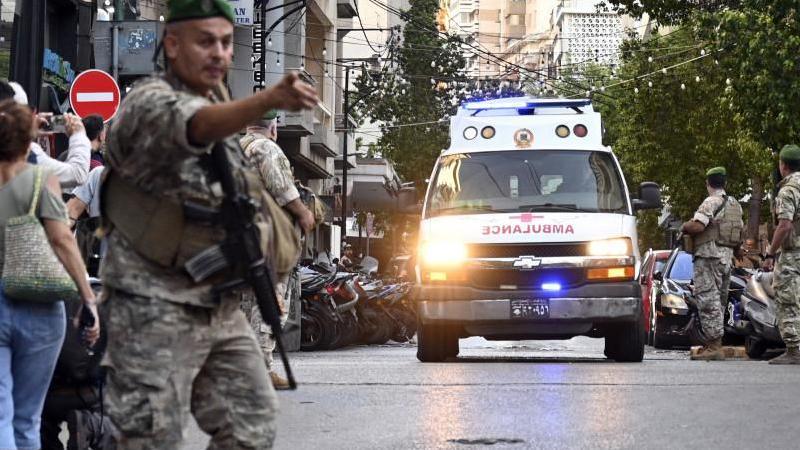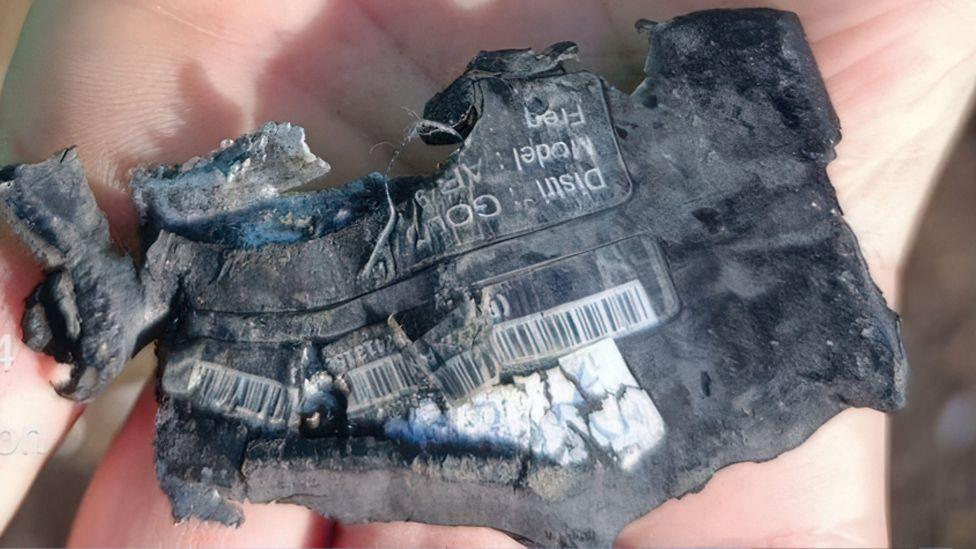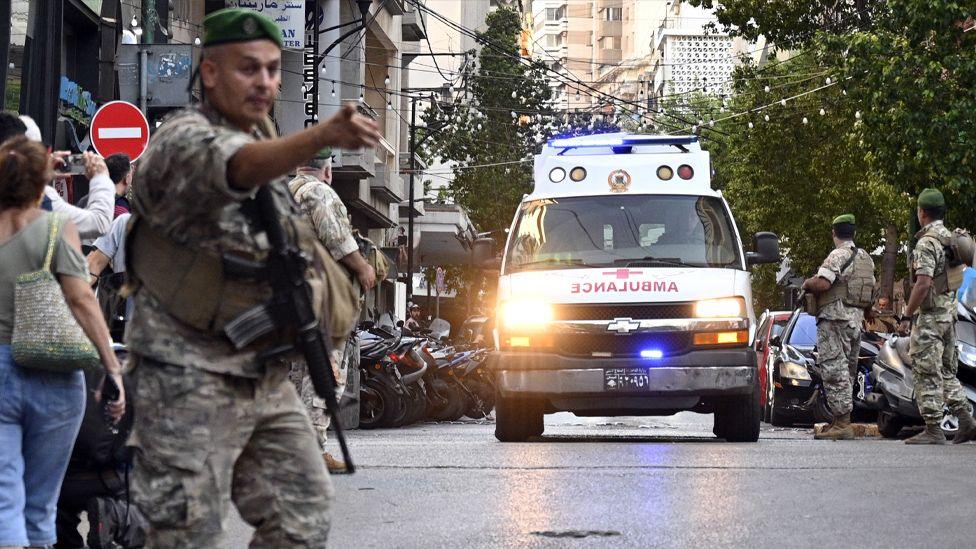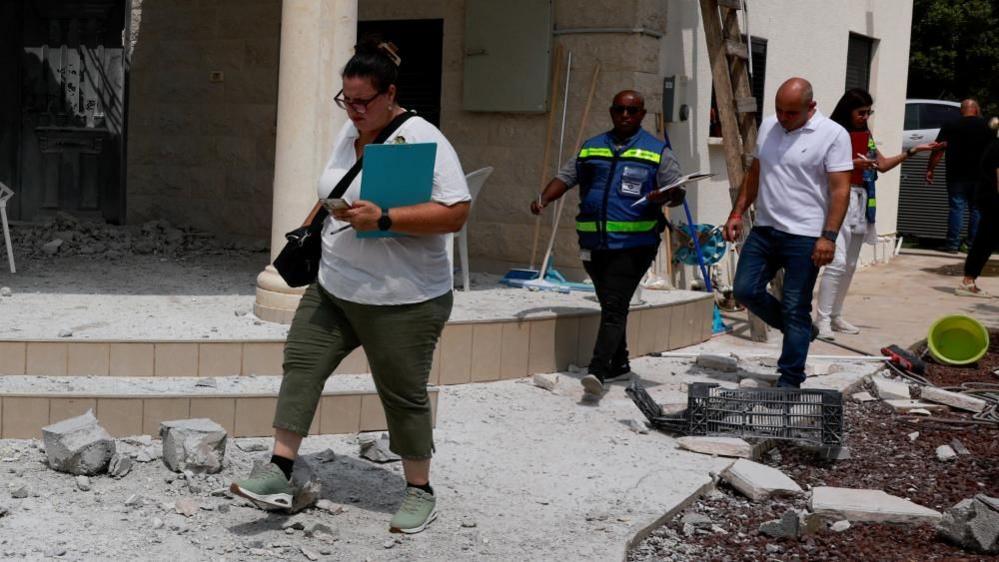Bowen: Tactical triumph for Israel, but Hezbollah won't be deterred

- Published
It has been the deadliest year in the conflict between Israelis and Palestinians since 1948, when Israel fought and won its war for independence – and this is one of the most dangerous moments since Hamas attacked Israel on 7th October last year.
Attacking Hezbollah’s communications network has delivered a tactical victory to Israel - the sort of spectacular coup you would read about in a thriller.
However there is a potentially serious strategic downside for Israel, because while this humiliates the powerful Lebanese militia and political movement, it doesn’t deter them.
And it doesn’t get closer to Israel’s strategic aim of stopping Hezbollah’s attacks and allowing the more than 60,000 Israelis on the northern border who haven’t been in their houses for nearly a year to return home.
The Israelis have used important, audacious weapons, which are clearly very effective in their terms.
But reports in Al Monitor, a respected Middle East newsletter, say that they were not able to use them in the way they hoped.
The original plan, it says, was for Israel to follow up with devastating attacks while Hezbollah was still reeling. The pager attack, the reports say, was to be the opening salvo in a big escalation - as part of an offensive or perhaps an invasion of southern Lebanon.
But these same reports say that Hezbollah was getting suspicious – forcing Israel to trigger these attacks early. So the Israelis have shown they can get into Hezbollah’s communications and shown they can humiliate them, but these attacks do not take the region one inch further back from all out war. Instead they push it closer.
Everything at the moment in terms of de-escalation in the Middle East depends on Gaza.
While that war continues, whether it’s conflict with Lebanon, whether it’s attacks in the Red Sea from the Houthis, whether it’s tensions with Iraq; nothing is going to de-escalate.
The US envoy to Lebanon Amos Hochstein has been working assiduously for months now - talking to the Lebanese, and indirectly to Hezbollah and to the Israelis, about trying to find a way to deescalate this diplomatically. And reportedly, the Israelis didn’t tell the US about what they were doing with this plan until last moments - so this won’t help his efforts either.
Watch: Small explosion in Lebanon supermarket
American predictions that a ceasefire in Gaza is close have come up again against two seemingly immovable objects.
One is the Hamas leader, Yahya Sinwar, who wants Israel out of the Gaza Strip permanently, as well as a big release of Palestinian prisoners in exchange for the remaining Israeli hostages in Gaza.
The other is Israel’s prime minister, Benjamin Netanyahu, who has stuck to his insistence that Israel can and will win a total victory over Hamas.
The consensus in Israel is that he benefits from prolonging the war, despite pressure from hostage families and their supporters for a deal to get their people home.
The prime minister’s ultranationalist allies in his coalition have also threatened to bring down the government if he makes a deal.
Israel and its allies insist that taking the war to its old enemies in Lebanese Hezbollah is an entirely legitimate act of self-defence.
But there is fury and alarm in Lebanon and the wider region that Israel’s attacks appear to have been launched with little concern for bystanders and family members who have been wounded and killed alongside Hezbollah fighters.
CCTV footage showed a pager exploding in a crowded market as its owner shopped for food. Reports in Lebanon say a young girl was killed when her father’s pager exploded.
Hezbollah will be reeling from the attacks, but it will rapidly compose itself as an organisation and will find other ways to communicate. Lebanon is a small country and messages can easily be carried by hand.
Undoubtedly Hezbollah and its allies in Iran, whose ambassador to Beirut was wounded in the attack, will be licking their wounds at the moment.
But once again the region has been pushed right to the brink of an all-out war.
Sooner or later, if this continues, they will fall over the cliff.
Related topics
- Published18 September 2024

- Published20 September 2024

- Published17 September 2024

- Published17 September 2024
